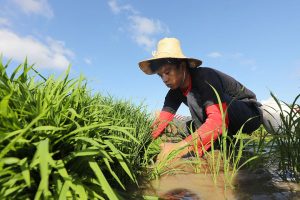Agricultural output likely flat to lower in 3rd quarter

By Luisa Maria Jacinta C. Jocson, Reporter
FARM OUTPUT likely remained stagnant, with a bias towards the downside, in the third quarter as crops sustained storm damage while farming operations are believed to have been disrupted by the rising cost of inputs like fuel and fertilizer, analysts said.
“The situation in the first and second quarter, which has been successive contractions, will not be better in the third quarter… on the whole, the third quarter will still see a contraction. My take is minus 1.0% to +0.3%,” Roy S. Kempis, retired Pampanga State Agricultural University professor, said in a Viber message.
Mr. Kempis said that this is due to a combination of the “continued adverse effects of the upheaval in Eastern Europe which disrupted supply and the physical destruction of crops, livestock and poultry at the peak of typhoon season.”
In the second quarter, the value of production in agriculture and fisheries at constant 2018 prices declined 0.6% due to weak crop and fisheries output. Production also contracted by 0.3% in the first quarter.
Agriculture accounts for about a tenth of Philippine gross domestic product.
“There was Severe Tropical Storm Florita (international name: Ma-On) in August and Typhoon Karding (international name: Noru) in September. The latter (did the most damage) because the rice harvest could have been done in a few days when it struck the country,” Mr. Kempis said.
“The recent Typhoon Karding will definitely affect the output of crops that are scheduled to be harvested will result in a little decline for the third and fourth quarter output to what is supposed to be an expected gain,” Philippine Chamber of Agriculture and Food President Danilo V. Fausto said in a Viber message.
Agricultural damage inflicted by Karding was estimated at P3.12 billion, according to the Department of Agriculture (DA).
The volume of lost production was estimated at 158,117 metric tons (MT) with 170,762 hectares of farmland and 108,594 farmers and fisherfolk affected.
Rice was the most affected commodity with losses valued at P2.05 billion. Lost volume was 134,205 MT across 163,162 hectares.
Meanwhile, damage from Florita hit P1.13 billion, affecting 6,647 farmers, with volume of lost production at 66,633 MT spanning 44,922 hectares of farmland.
“Whether these typhoons cross the land mass or not, too much rainfall dropping in huge amounts in so short a time wreaks havoc on agricultural production with floods and landslides,” Mr. Kempis said.
The Russia-Ukraine war also disrupted imports of fertilizer and fuel, according to Mr. Kempis.
The Philippines imports most of its fertilizer. In 2021, it imported 95% of the fertilizer requirement.
“While inflation is generally bad, the inflationary effect of the Eastern Europe upheaval, is to partly elevate to some extent the values of production. We can expect some semblance of agricultural growth. Apparently, this price effect on the value of outputs could not outweigh the price effect on the cost of inputs, especially fertilizer, agri-chemicals, and fuel,” Mr. Kempis said.
“The little improvement in yield per hectare for rice and corn can even outweigh the increase of fertilizer cost,” Mr. Fausto added.
Headline inflation accelerated to 6.4% in July. It eased to 6.3% in August before surging to 6.9% in September and 7.7% in October.
At the end of September, the average price of a bag of prilled urea rose 64.7% year on year to P2,523.08.
In September, oil companies cut pump prices for gasoline by P4.7 per liter, diesel by P9.95 per liter, and kerosene by P9.1 per liter.
“With the destruction of crops especially rice and the disruption of operations in livestock, poultry and fisheries, what could happen in terms of agricultural output in the third quarter is like rubbing salt onto an injury. And this is too much for our agricultural producers, especially small farmers,” Mr. Kempis added.
Samahang Industriya ng Agrikultura Executive Director Jayson H. Cainglet said that excessive imports will discourage farmers and lead to lower production.
“It will get worse if we continue with our reckless policy of unabated imports. Unfortunately, the marching orders of President Ferdinand R. Marcos, Jr. are being ignored by elements within the DA who continue to allow the flooding of imports in our market,” he said in a Viber message.
The agricultural trade deficit expanded 15% year on year in the second quarter to $2.72 billion, according to preliminary data issued by the Philippine Statistics Authority (PSA).
Agricultural imports rose 22% to $4.84 billion or 13.5% of all imports.
The PSA is scheduled to release its third-quarter report for agriculture production on Nov. 9.




